The Circle of Courage is a model of resilience built upon the belief that all individuals, regardless of their age, have four universal needs. When any one or more of these universal needs is not being met, our “circle” is thought to be broken and as a result there are symptoms and reactions such as worry, fear, loneliness, depression, or anxiety.
Let’s take a look at how the coronavirus pandemic might be impacting our own circles and how we can keep them whole.
Belonging
We are all being asked to physically withdraw from anyone outside of our immediate families. This is a challenge and can lead many of us to feel lonely and isolated. We miss our co-workers and students!
What can you do?
While we must physically withdraw, we can maintain social connections through phone calls, email, text, social media, and other virtual platforms. It is important to maintain contact with students, colleagues, friends, and families during this time.
Mastery
If you feel best in your role as an educator, this might be a hard time for you. It may also be tough to balance the demands of being at home with your own families while staying connected with your students virtually. Sometimes when we are stretched in too many directions we don’t feel like we are doing well in any area.
What can you do?
Focus on one thing at a time. Small increments of quality time with your own family will go a long way. If you are feeling like you don’t know what to do with all the time you do have, use this time for things that you normally don’t have time to practice and enjoy such as reading, writing, creative artwork, puzzles, handy work around your home, and playing with your own children or pets.
Independence
This coronavirus pandemic is leaving many of us feeling uncertain and powerless to do anything about our situations.
What can you do?
Take time to care for yourself. You may be feeling a range of emotions and staying regulated might be a challenge. Rest, move your body, and take deep breaths as often as needed.
Generosity
If you are stuck at home during this time you may feel like you aren’t doing much to help others.
What can you do?
Draw pictures or write letters to friends, family, your students, and colleagues. Check your local extended care facilities, homeless shelters, and residential treatment centers for children who would love receiving letters or drawings from you during this time.
Developed by Starr’s 2nd President, Dr. Larry K. Brendtro (PhD), and his colleagues, the Circle of Courage® provides the philosophical foundation for Starr’s resilience-focused approach to working with children, families, and communities, in addition to the work of Reclaiming Youth International.
Exclusive Deals!
Use the code 10STEPS29 at checkout to save!
10 Steps to Create a Trauma-Informed Resilient School provides the tools you need to put your classroom, school, or district on the path to becoming trauma-informed and building resilience in all students. This latest edition, complete with a new name, features over 100 more pages of lessons, activities, and case studies to ensure schools are even more equipped to break through the social emotional barriers to learning.
With this great resource, you will:
- Gain an understanding of how childhood trauma impacts learning and behavior.
- Review actual scenarios and expert answers to tough questions.
- Learn 10 concrete steps to guide the creation and implementation of a trauma-informed school.
- Be provided practical activity worksheets to copy for use with students.
- Have access to Starr PTSD assessments, Life Event Checklist, ACE questionnaire, and school questionnaire forms.
Deep Brain Learning provides a blueprint for building strength and resilience in all youth by creating positive environments filled with opportunities that support the four universal needs of the Circle of Courage, while 10 Steps to Create a Trauma-Informed School provides a guide to care for all students' universal needs in schools.


